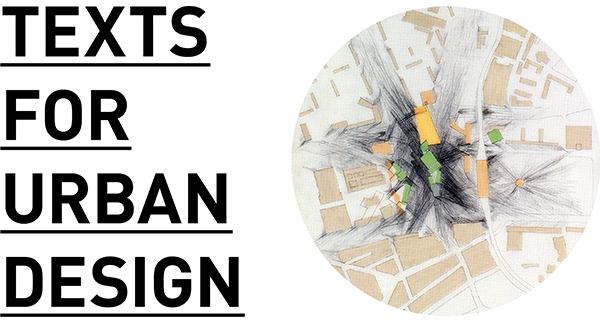SEITE DRUCKEN
LEHRE
FALLSTUDIEN ZUM URBANEN RAUM: WAHLFACH FS17

Urban Design Theory: Texts, Positions, and Discourses
FS17: Architecture and Politics of Urban Form
In this seminar, we will take a journey through different positions concerning the city as architectural form and as political form.
The Architecture of the City:
In the first part of the semester, we will read and discuss theories that investigate how architecture can define form within the contemporary city, with special regard to the resulting social-material relations. Aldo Rossi, for example, highlights urban artifacts as objects with individuality that depends more on their form than their material. Artifacts are complex entities that develop over space and time, gain historical richness through the sum of all related experiences and memories, and can house various functions while maintaining their specific original values.
The City as Political Form:
The city is the most explicit index of its power relationships or, as Pier Vittorio Aureli puts it, is itself a political form. To this end, in the semester’s second part we will become acquainted with positions that address the production of urban form as reflection of politics and social-cultural relations. Rem Koolhaas suggests that today’s Generic City is a justified reflection of present-day needs and society's current urban abilities. Its physical characteristics are thus spaces of anomie and atomism, neutral and beige with unnoticeable buildings, dominated by the automobile, and signified by an increasingly tropical friendliness. His positions echo the writings of Robert Venturi and Denise Scott Brown some twenty years earlier regarding the de facto urbanism of the Vegas Strip, which they appreciate for its richness of communication, its representation of everyday consumer values, and its representative American form.
Politicized Public Space and the Urbanity of Things:
The semester’s final part will be based on the French philosopher Bruno Latour’s theory, according to which not only humans, but also things have agency. Objects thus, bind all of us in ways that result in a perception of public space profoundly different from what is usually recognized under the label of the political. In contrast to the idea of container space, a neutral corpus that simply absorbs material objects, this concept of relational space describes the reciprocal impacts of space and social activity in terms of their specification and adaptation. Latour’s approach has been translated into urban design theory and practice by the Catalan urban planner Manuel de Solà-Morales, who coined the term urbanity of things to investigate the social phenomenon of urbanity from the perspective of physical objects and their agency.
What we will do:
Following an introductory lecture, we will discuss one text each week and juxtapose the different positions they represent to each other. Accordingly, participants will be expected to read one short text each week, to once prepare and hold a 15-minute presentation of a text and to actively participate in the discussions. Optionally, position papers can be written after the semester as elective theses. A reader with selected texts and short thematic introductions will be provided.
CLASSES: Thursdays, 4–6 PM
ROOM: HIL E 10.1
INTRODUCTION: Thursday, 22.9.2016, 4 PM
LANGUAGE: English
PARTICIPANTS: Max. 20
Mystudies: 051-0668-17 G
ECTS: 3 credit points
LECTURER: Daniel Kiss
